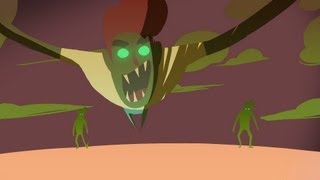(单词翻译:单击)
Worst case scenario: zombie apocalypse. How will you survive?
最坏的情况:僵尸末日来临。你要怎么活下去?
You might be surprised to find out how much geography skills can help you fend off doom.
你可能会惊讶的发现,地理学知识可以救你一命。
By geography, I mean analyzing the world around you.
这里所说的地理学,是指分析周围环境的能力。
One geographic concept that could really help you out in a zombie apocalypse is movement.
僵尸末日时,一个非常有用的地理学概念就是移动。
So, first, what moves? People move, animals move, and, while sometimes slowly, zombies move as well.
那么首先,什么会移动?人会移动,动物会移动,还有,虽说行动缓慢,但僵尸也会移动。
But that's not all. Goods move, too.
但不仅如此。货物也会移动。
Goods can be resources, such as food supplies and weapons.
货物可以是资源补给,例如食物和武器。
People or zombies tend to move these.
人和僵尸都会移动这类物品。
So, if you see a big pile of zombie supplies where there wasn't one before, you're probably on the trail.
所以,如果你看到一大堆僵尸补给品,而之前没有的话,那你最好赶快撤吧。
Ideas also move. Ideas can include entertainment, zombie movies,
想法也会移动。属于想法的有娱乐、僵尸电影、
news and information about zombie attacks, and architecture, or how to build a safe shelter.
关于僵尸攻击人类的新闻和信息、还有建筑技术,就是如何建造安全的避难所。
And, second, why do people or zombies move?
其次,为什么人和僵尸会移动?
When people, animals, or zombies move, it's called migration.
人,动物以及僵尸的移动,叫做迁徙。
Two concepts that affect migration are push and pull factors.
导致迁徙的两个概念是推力因素和拉力因素。
Push factors will make you want to leave somewhere.
推力因素会让你想要离开某地。
Pull factors make you want to go to a place.
拉力因素会让你想要前往某地。
A lack of resources, unstable economy, or high crime rate might be push factors making people want to move.
资源短缺、经济不稳定、犯罪率高,都可以是让人们想要离开的推力因素。
Nice weather, a good economy, or lots of resources would be pull factors for lots of people, enticing them to move.
气候怡人、经济良好、资源丰富,都可以是拉力因素,促使人们移动。
While zombies are definitely a push factor for humans,
僵尸的存在对人类来说,当然是一个推力因素,
a city full of people would be a pull factor for hungry zombies who want to eat humans.
而住满人类的城市对想吃人的饥饿僵尸来说,肯定是一个拉力因素。

There are some things that make movement easier for people or zombies.
有些东西可以使人类的移动比僵尸更方便。
Waterways and highways can make traveling faster.
水路和公路会加快旅行的速度。
Moving across clear, open space is easier than a tough terrain.
通过开阔地带要比通过复杂的地形更容易。
And just as land forms can create boundaries that affect movement,
就像地形可以划分界限影响移动一样,
so can political boundaries, like a border gate, for example.
政治界限也可以起到同样效果,例如设立边境岗哨。
So, how can you analyze these movement factors to help your chance of survival?
那么,你应当如何分析这些移动因素,来提高你的生存几率呢?
There are three basic steps.
有三个基本步骤。
One - identify the points or locations to analyze. What are your options?
一,确认要分析的地点或地区。看看你都有什么选择。
Two - find what connects them. Are there highways, waterways, or open land?
二,找到这些地点的连接方式。是公路,水路,还是开阔地?
And three - find the patterns of movement that happen over that connection.
三、找寻这些连接之间平常的移动模式。
Do people or goods move across it?
人和货物有在移动吗?
By comparing relationships between different places, you can see what connections they have.
比较不同地点之间的关系,你就可以它们是如何连接的。
For example, pick two cities. Look at the highway connecting them.
举个例子,有两个城市,之间用高速公路连接。
If people use that highway to commute to work, those cities have a strong relationship.
如果人们使用高速公路上下班,那这两个城市之间就有很亲密的关系。
But this other city over here doesn't have a direct connection to the other cities.
但是这里的另一个城市和其他城市没有直接的连接。
There's even a river in the way. It doesn't have as strong of a relationship.
中间甚至还有河水隔开。那么就不存在非常亲密的关系。
If a zombie outbreak started here, which city would you rather start out in? Where would you flee to?
如果僵尸在此处爆发,你愿意逃离哪座城市?你想逃往哪里?
So, how do you decide where to go in a zombie apocalypse?
在僵尸末日来临时,你要怎么决定该去哪里呢?
Do you just run in a random direction?
是向随机方向跑吗?
Or do you use your geographic skills to lead your camp of survivors to safety?
还是运用你的地理知识,带领你的生还者伙伴们逃生?
If you want to stay alive, it helps to understand how and why we move.
如果你想活下去,就要了解我们如何及为何移动。


